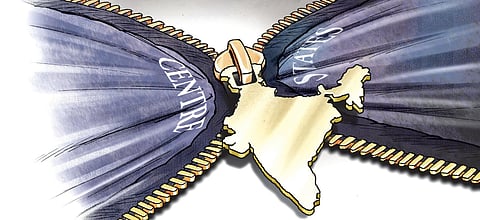

Arguably, federalism or the relationship between the Centre and the states is at its lowest point in recent decades. The ongoing tussle over the Goods and Services Tax (GST) compensation accentuates a rather worrying trend. If one were to make a metaphor from the story of Onam, a festival that has just passed, then the Centre has imagined and inflated itself to be a Vamana, and is looking for its three steps to deflate Mahabali, which here would mean the states.
Look at the growing rustle of words around the GST compensation. Kerala’s finance minister, Thomas Isaac, the most vocal, tweeted: “No state with atmanirbhar [perhaps he meant self-respect more than self-sufficiency] can accept this. Enough is enough.” West Bengal Finance Minister Amit Mitra was sharp when he said it was not an ‘act of God’ as Union Finance Minister Nirmala Sitharaman had described it, but an ‘act of fraud’.
Finance ministers of states like Punjab, Delhi, Chhattisgarh, Telangana, Rajasthan and Maharashtra spoke in terms of ‘betrayal’ and ‘double standards’. Former prime minister H D Deve Gowda, who heads a regional party, also weighed in: “To ask the states to borrow is a skewed idea,” he said. He also warned that the states and the Centre being at loggerheads all too frequently did not augur well for our well-being as a nation. Suddenly, the one nation, one tax idea was leading to a seditious impulse. Federalism itself seemed to be in crisis.
A little before the GST issue came up, there was more that challenged federalism. DMK leader Kanimozhi brought up the Hindi mindset issue, which has been resurfacing with greater frequency in the last couple of years than the last couple of decades. She was upset when a central security officer at an airport allegedly tried to equate her proficiency in Hindi with her Indianness and nationalism. The discussion on the National Education Policy, the two and three language formulas, environmental policies, agricultural reforms, fifteenth finance commission, CAA, NRC, etc., have only expanded the kerfuffle, and the growing distrust between the states and the Centre in recent times.
Besides all this, the cultural autonomy of the states have also felt threatened because of an ideological arraignment of oneness. Cultural matters are often reduced to linguistic matters but it is far wider than that. Again, to pick the example of Kerala, the attempt to redefine Onam as a festival of one community, and to replace the celebration of the munificent king Mahabali’s annual arrival with his three-feet defeat by Vamana, has reignited flawed ethnic binaries.
It burns bridges between two world views and shakes the foundation of federalism. Federalism’s survival depends not just on discharge of honourable agreements related to distribution of constitutional powers and financial resources, but on repeated guarantees to nurture the diversity of our oneness. Cultural federalism actually forms the basic frame. Interestingly, the two big Commissions we have had since the 1980s on Centre-states relations, the Justice Sarkaria Commission and the Justice Punchhi Commission, go into several material aspects of federalism but are silent on cultural federalism, which is the invisible glue that binds the nation together. However, the Sarkaria Commission recommended an Inter State Council (ISC), which was meant to be a forum for dialogue between the Centre and states.
It was expected to meet three times a year under the chairmanship of the prime minister, with chief ministers as members. All issues that troubled the conscience of the nation, in any corner, could be brought up there. ‘Investigating such subjects, in which some or all the states or the Union and one or more states have a common interest,’ was its mandate. However, the record of the ISC meetings are dismal, and that could be one barometer to explain the overcast conditions.
The ISC met the first time in October 1990 under V P Singh, but P V Narasimha Rao never held a single meeting. Deve Gowda revived the ISC and the United Front government held it thrice in under two years. Vajpayee held it four times in six years. Manmohan Singh only twice in 10 years and Narendra Modi only once in the past six years. Interestingly, when Gowda, a regional leader took over in Delhi, there was greater commitment to federal dialogue. One thought Modi, who had served as chief minister for a long period, would inject fresh energy here, but that has not been the case.
In Chapter 21 of the Sarkaria Commission report, there are two brilliant paragraphs. The first says: “There is a general tendency towards greater centralisation of powers. There is special need in a country like India for a conscious and purposive effort to counter it all the time. There is considerable truth in the saying that undue centralisation leads to blood pressure at the Centre and anaemia at the periphery. The inevitable result is morbidity and inefficiency.
Indeed, centralisation does not solve but aggravates the problems of the people.” The second reads: “In view of the relatively communal nature of some ‘majorities’ and ‘minorities’ of different hues (of religion, caste, language, race, etc.) at different governmental levels of our country, it is most important that democracy is seen as government by ‘compromise’ between the majority and the minority, and not an authoritarian use by the former of its voting power riding roughshod over the latter… If the power of vote that democracy gives us is used thoughtlessly, or fanatically along communal lines, it may eventually sound the death-knell of secular democracy itself, in our heterogeneous society.” These two paras, understood well, can help the Centre and the states to waltz as a truly cooperative federal polity.
Sugata Srinivasaraju
Senior journalist and author
(sugataraju@gmail.com)